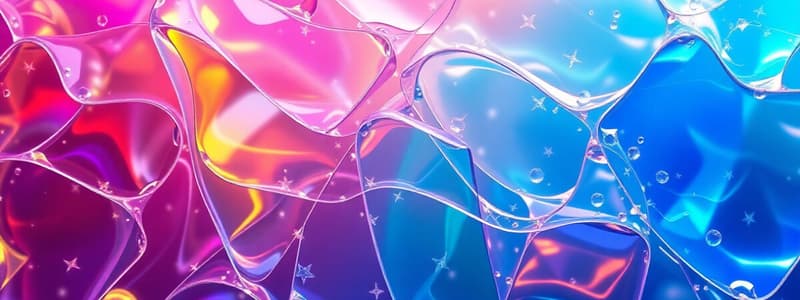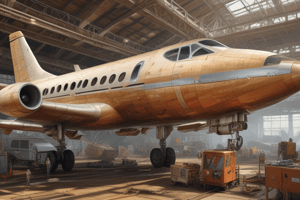Podcast
Questions and Answers
What is the main characteristic of whiskers in non-metallic aircraft materials?
What is the main characteristic of whiskers in non-metallic aircraft materials?
- They are longer than they are wide. (correct)
- They are used solely for insulation.
- They are square shaped.
- They are filaments.
Which type of laminate structure is considered strong and stiff but heavy?
Which type of laminate structure is considered strong and stiff but heavy?
- Fiber laminates
- Solid laminates
- Sandwich structures
- Laminated structures (correct)
What is a characteristic advantage of using reinforced plastic in aircraft materials?
What is a characteristic advantage of using reinforced plastic in aircraft materials?
- Low strength-to-weight ratio
- High electrical conductivity
- High thermal conductivity
- Excellent resistance to mildew (correct)
What do sandwich-type laminates utilize as a core material?
What do sandwich-type laminates utilize as a core material?
How are solid laminates created?
How are solid laminates created?
Among non-metallic aircraft materials, which is listed as used the least?
Among non-metallic aircraft materials, which is listed as used the least?
What best describes the purpose of reinforcements in composite materials?
What best describes the purpose of reinforcements in composite materials?
Which of the following materials provides excellent dielectric characteristics?
Which of the following materials provides excellent dielectric characteristics?
What is a characteristic of thermoplastic materials?
What is a characteristic of thermoplastic materials?
Which of the following statements about thermosetting plastics is true?
Which of the following statements about thermosetting plastics is true?
What purpose do laminated transparent plastics serve?
What purpose do laminated transparent plastics serve?
What distinguishes stretched acrylic from other transparent plastics?
What distinguishes stretched acrylic from other transparent plastics?
How are transparent plastics classified based on heat reaction?
How are transparent plastics classified based on heat reaction?
Which type of plastic material is typically used in windows for aircraft?
Which type of plastic material is typically used in windows for aircraft?
Which of the following is true about monolithic transparent plastics?
Which of the following is true about monolithic transparent plastics?
In which manner do thermosetting plastics behave when reheated?
In which manner do thermosetting plastics behave when reheated?
What are the primary benefits of rubber in aircraft applications?
What are the primary benefits of rubber in aircraft applications?
Which type of rubber is noted for having better physical properties for aircraft use?
Which type of rubber is noted for having better physical properties for aircraft use?
What limits the suitability of natural rubber for use in aircraft?
What limits the suitability of natural rubber for use in aircraft?
Which of the following options is a common type of synthetic rubber used in aviation?
Which of the following options is a common type of synthetic rubber used in aviation?
What is a key characteristic of butyl rubber?
What is a key characteristic of butyl rubber?
Which property is NOT associated with natural rubber?
Which property is NOT associated with natural rubber?
How do synthetic rubbers differ from natural rubber?
How do synthetic rubbers differ from natural rubber?
What advantage does synthetic rubber provide over natural rubber?
What advantage does synthetic rubber provide over natural rubber?
What advantage does Bismaleimide (BMI) have compared to epoxy resins?
What advantage does Bismaleimide (BMI) have compared to epoxy resins?
Which property is NOT associated with semicrystalline thermoplastics?
Which property is NOT associated with semicrystalline thermoplastics?
What characterizes amorphous thermoplastics?
What characterizes amorphous thermoplastics?
What unique feature does Polyether Ether Ketone (PEEK) possess?
What unique feature does Polyether Ether Ketone (PEEK) possess?
What distinguishes a two-part sealant from a one-part sealant?
What distinguishes a two-part sealant from a one-part sealant?
Which of the following is NOT an advantage of advanced composite materials?
Which of the following is NOT an advantage of advanced composite materials?
Which statement best describes the C stage in thermosetting resin curing?
Which statement best describes the C stage in thermosetting resin curing?
What is the primary structural advantage of laminated composite materials?
What is the primary structural advantage of laminated composite materials?
What occurs during the B stage of resin curing?
What occurs during the B stage of resin curing?
Since when have advanced composite materials been utilized in aerospace applications?
Since when have advanced composite materials been utilized in aerospace applications?
What is a key feature of thermoplastic resins?
What is a key feature of thermoplastic resins?
What is the purpose of orienting fibers in alternating directions in laminated structures?
What is the purpose of orienting fibers in alternating directions in laminated structures?
Which of the following is NOT a characteristic of thermoplastic resins?
Which of the following is NOT a characteristic of thermoplastic resins?
What is a primary application of advanced composite materials in modern aircraft?
What is a primary application of advanced composite materials in modern aircraft?
Which type of sealant is typically adjusted in consistency using a thinner?
Which type of sealant is typically adjusted in consistency using a thinner?
What characteristic of advanced composite materials makes them favorable over aluminum?
What characteristic of advanced composite materials makes them favorable over aluminum?
Flashcards are hidden until you start studying
Study Notes
Transparent Plastics
- Used in aircraft canopies, windshields, and windows.
- Classified into two types based on reaction to heat: thermoplastic and thermosetting.
- Thermoplastic softens when heated and hardens when cooled.
- Thermosetting hardens upon heating; reheating has no softening effect.
Transparent Plastics (continued)
- Manufactured in two forms: monolithic (solid) and laminated.
- Laminated consists of transparent plastic face sheets bonded by an inner layer material.
- Offers shatter-resistant qualities.
Stretched Acrylic
- A new development in transparent plastics.
- The molecular structure is rearranged by pulling stretched acrylic in both directions before shaping.
Reinforced Plastics
- A thermosetting material used in the manufacturing of radomes, antenna covers, wingtips, and insulation for electrical equipment and fuel cells.
- Possesses excellent dielectric characteristics, high strength-to-weight ratio, resistance to mildew, rust, and rot, and easy fabrication.
- Formed of either solid laminates or sandwich-type laminates.
Solid Laminates
- Constructed of three or more layers of resin-impregnated cloths laminated together to form a solid sheet facing or molded shape.
Sandwich-Type Laminates
- Constructed of two or more solid sheet facings or a molded shape enclosing a fiberglass honeycomb or foam-type core.
Rubber
- Prevents the entrance of dirt, water, or air and the loss of fluids, gases, or air.
- Used to absorb vibrations, reduce noise, and cushion impact loads.
- Includes natural rubber, synthetic rubbers, and silicone rubbers.
Natural Rubber
- Offers good physical properties like flexibility, elasticity, tensile strength, tear strength, and low heat buildup from flexing.
- Its suitability for aircraft use is limited due to its inferior resistance to deterioration influences.
Synthetic Rubber
- Available in several types, each compounded with different materials to achieve desired properties.
- Widely used types include butyls, Buna-S, and neoprene.
Butyl
- Offers superior resistance to gas permeation and deterioration from oxygen, vegetable oils, animal fats, alkalies, ozone, and weathering.
- Exhibits low water absorption rate and good resistance to heat and low temperatures.
Sealing Compounds
- Classified into one-part and two-part sealants.
- One-part sealants are pre-prepared and ready to use, with consistency adjustable with a thinner.
- Two-part sealants require separate packaging of a base compound and an accelerator, which must be mixed in prescribed ratios for proper curing and material quality.
Advanced Composite Materials
- Increasingly used in aerospace structures for their weight savings compared to aluminum.
- Applications include fairings, spoilers, and flight controls.
- Modern large aircraft feature composite fuselage and wing structures.
- Advantages include high strength, low weight, and corrosion resistance.
Laminated Structures
- Composite materials combine distinct components to achieve superior structural properties, with individual materials remaining physically identifiable.
- Advanced composites consist of fibrous materials embedded in a resin matrix, laminated with fibers oriented in alternating directions to enhance strength and stiffness.
Bismaleimide (BMI)
- Offers higher temperature capability and toughness than epoxy resins.
- Provides excellent performance at ambient and elevated temperatures.
Matrix Material - Thermoplastic Resins
- Thermoplastic resins can be repeatedly softened and hardened with temperature changes.
- Allows for fast processing and shaping through molding or extrusion without chemical curing.
Semicrystalline Thermoplastics
- Possess inherent flame resistance, superior toughness, good mechanical properties at elevated temperatures and after impact, and low moisture absorption.
Amorphous Thermoplastics
- Offer processing ease and speed, high temperature capability, good mechanical properties, excellent toughness and impact strength, and chemical stability.
Polyether Ether Ketone (PEEK)
- This aromatic ketone material offers outstanding thermal and combustion characteristics and resistance to a wide range of solvents and proprietary fluids.
Curing Stages of Resins
- Thermosetting resins use a chemical reaction to cure.
- Three curing stages: A, B, and C.
Curing Stages of Resins (continued)
- A Stage - The chemical reaction has started, and the resin thickens and becomes tacky.
- B Stage - The resin is fully cured.
- C Stage - Some resins cure at room temperature.
Studying That Suits You
Use AI to generate personalized quizzes and flashcards to suit your learning preferences.




